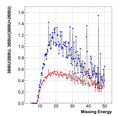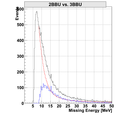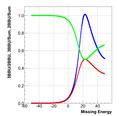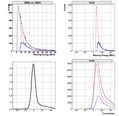3He(e,e'd) Analysis
Mail for Golak
Simon prepared an letter for Golak and sent it yesterday. He described
our experiment and presented our results. I have contributed some
photos. Now we are waiting for his replay and his new calculations.
Mainz Results for (e,e'p):
Achenbach et al. EPJ (2008)
I would like to compare my results with these measurements. We are both having
very similar kinematics conditions. I need to run MCEEP simulation
to estimate the 2BBU contribution inside the 3BBU.
01.)  02.)
02.) 
My results:
My results from last week:
03.)  04.)
04.)  05.)
05.) 
My Mceep Simulation:
Input script:
4000000 #n_event
5,5,5,5,5,5 for default ranges
938.27,1,5.5 m_eject,z_eject,em_bound
2425.5,0.,0.,2300.,14.5,0.,500.,-75.0,0. kinematics
4.5,-4.5,80.0,-60 momentum acceptances
'R','R',60.,130.,200.,500. nominal solid angles
0.4461,4.5183,1. luminosity,time,spec_fac
50.,5.5,5.5 for singles only
3.,2.,0.000134,4,3 targ: a,z,dens,targ_mod,eloss_mod
-0.2, 0.2 targ: cell start/end
1.109,6.100 drift to aperture - nom. sld. ang.
0.8,0.,0.,0.,0. beam: pol, vert, disp, df, tof_win
0.,0.,0.,0.,0. beam: FWHM in cm,cm,mr,mr,%
0.,0.,0.,0.,0. beam: offset in cm,cm,mr,mr,%
'R',0.0040,0.0040 beam: raster shape, X size, Y size
'E',T,0,-90.,0.,0.,0. ELECTRON ARM
'P',T,0,-90.,0.,0.,0. HADRON ARM
1 # global cuts
5,-0.15, 0.15
0 #specific cuts
12 # plots
'NTU',1,2,5,24,'He3QEResults.ntu'
'P1D',1,-0.3,0.3,100,1.,0.,0,5,'He3QEResults_ReacZ.top'
'P1D',1,0.,300.,200,1.,0.,0,15,'He3QEResults_omega.top'
'P1D',1,0.,0.5,200,1.,0.,0,19,'He3QEResults_Q2.top'
'P2D',1,0.,300,0,0.5,50,50,1.,1.,0.,0.,0,15,19,'He3QEResults_omegaQ2.top'
'P1D',1,0.1,50.,200,1.,0.,0,24,'He3QEResults_ExEn.top'
'P1D',1,0.1,50.1,201,1.,0.,0,34,'He3QEResults_MissEn.top'
'P1D',1,0.,300.,200,1.,0.,0,26,'He3QEResults_MissMom.top'
'P1D',1,-1.8,0.0,200,1.,0.,0,18,'He3QEResults_Phiq.top'
'P1D',1,200,900,200,1.,0.,0,12,'He3QEResults_pBB.top'
'P1D',1,0,0.4,200,1.,0.,0,22,'He3QEResults_thPQ.top'
'P1D',1,200,900,200,1.,0.,0,16,'He3QEResults_qvec.top'
Comments: 3He(e,e'p)d with JLAB Hall A HRS
10 uA on
Running script:
#!/bin/sh
#
# Script to run mceep and compare output with that provided
# with the distribution.
#
# Set up environment variables.
#
current_directory=`pwd`
mceep_home="/home/miham/mceep/mceep"
cd $mceep_home
cd utilities
mceep_cmn=$mceep_home/cmn; export mceep_cmn
mceep_dat=$mceep_home/dat; export mceep_dat
mceep_util=$mceep_home/utilities; export mceep_util
mceep_output=$mceep_home/output; export mceep_output
mceep_input=$mceep_home/input; export mceep_input
#
# Set up file names.
#
prefix="He3QE"
infile=$prefix".inp"
sumfile=$prefix".sum"
outfile=$prefix".cmp"
cp -v $current_directory/$infile $mceep_input
cd $mceep_input
#
# Run mceep with info taken from temp_mceep.
#
echo $prefix > temp_mceep
#---2BBU
echo "B" >> temp_mceep
#---3BBU
#echo "C" >> temp_mceep
echo "2" >> temp_mceep
echo " " >> temp_mceep
echo "101" >> temp_mceep
echo "P" >> temp_mceep
echo "24" >> temp_mceep
echo "n" >> temp_mceep
#../sources/mceep < temp_mceep > $outfile
#../sources/mceep
$mceep_home/mceep < temp_mceep
#echo $outfile"/elastic*"
fajli=`ls He3QEResults*`
mv $mceep_input/$fajli $current_directory"/."
echo Done!!!
Results of the simulation:
Results of my mceep simulation. I modified the HRSR
to act as BigBite. I added some additional distance to
introduce some more energy-losses (only for Multiple
Scattering and broadening of the peaks).
06.)  07.)
07.) 
Convoluted results with Gaussian distribution:
I will use this approximation in my further calculations.
This approximation does not work well for MissEn > 20MeV.
We can not expect this simulation to work perfectly.
However, we do not have many data points there. We do not
lose much. We can always justify this type of broadening with
gauss.
08.)  09.)
09.)  10.)
10.) 
Convoluted results with Sum of Three Gaussian distributions:
I have decided I will not use this one, because I do not know
how to justify it. In addition, this is a simple simulation
(quick and dirty) and we can not expect to work perfectly.
11.)  12.)
12.)  13.)
13.) 
Last modified: 01/25/12
 02.)
02.) 
 04.)
04.)  05.)
05.) 
 07.)
07.) 
 09.)
09.)  10.)
10.) 
 12.)
12.)  13.)
13.) 